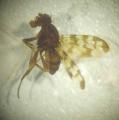Diptera.info :: Identification queries :: Diptera (adults)
Who is here? 1 guest(s)
|
Mycetophilinae (Mycetophilidae) -> Mycetophila sp
|
|
| smol |
Posted on 30-01-2024 13:38
|
|
Member Location: Posts: 411 Joined: 06.07.22 |
Netherlands, 2024-01-29 Believe subfamily Mycetophilinae. Can more be said? Not sure which resources I can use for this.   
Edited by smol on 03-02-2024 21:34 |
|
|
|
| John Carr |
Posted on 30-01-2024 14:02
|
|
Super Administrator Location: Colorado, USA Posts: 10606 Joined: 22.10.10 |
The key to Mycetophilidae sensu lato by Søli et al. (2000) may help. https://sciaroide...node/22756 |
| smol |
Posted on 31-01-2024 22:25
|
|
Member Location: Posts: 411 Joined: 06.07.22 |
John Carr wrote: The key to Mycetophilidae sensu lato by Søli et al. (2000) may help. https://sciaroide...node/22756 Once again, thank you for these resources John Carr! This was quite the puzzle, but I believe this could be one of the genus Rymosia. I found the following key for this genus: http://www.online...a_sp_n.pdf. My only doubt is the apical brownish colouration of the hind femora. They start with either a basal brown spot or femora completely yellow… However, if his fits "hind femora completely yellow", or maybe just without the basal brown spot, then with a lot of struggle I key to either R. affinis or R. fasciata. I believe this is a female, which makes the ID a bit harder. The doubt is in the use of "second proepisternal". I assume this is about the setae groups of upper and lower, where "second" refers to the "lower" group? If so, this would not be visible I believe (anterior above front coax). I tried my best, likely made a lot of mistakes... but learning. Edited by smol on 31-01-2024 22:39 |
|
|
|
| John Carr |
Posted on 01-02-2024 10:14
|
|
Super Administrator Location: Colorado, USA Posts: 10606 Joined: 22.10.10 |
I think you took a wrong turn at Søli couplet 95. Your fly matches "Anepisternum with strong bristles at least near upper margin". |
| Walther Gritsch |
Posted on 01-02-2024 13:06
|
|
Member Location: Copenhagen Posts: 291 Joined: 31.01.09 |
Anepimeron isn't visible, but the general impression leads me to Mycetophila sp.
Walther |
|
|
|
| smol |
Posted on 03-02-2024 21:33
|
|
Member Location: Posts: 411 Joined: 06.07.22 |
John Carr wrote: I think you took a wrong turn at Søli couplet 95. Your fly matches "Anepisternum with strong bristles at least near upper margin". Thank you very much again! You are right, I looked at the katepisternum... Walther Gritsch wrote: Anepimeron isn't visible, but the general impression leads me to Mycetophila sp. Thank you very much Walther Gritsch. With the correction of John Carr, I came to the same conclusion. I added a picture of where I believe in the Anepimeron with setae.    I could not find much further information, but read that from this point on most are categorized in species-groups, but did not find resources that described what is needed for further ID. At least not Mycetophila ruficollis-group I believe, but not sure further. If more details are needed, I can look through the raw pictures again. I have read Peter Chandler talked about making an extensive key of this genus, but could not find more about this. |
|
|
|
| Walther Gritsch |
Posted on 04-02-2024 12:39
|
|
Member Location: Copenhagen Posts: 291 Joined: 31.01.09 |
I don't think it belongs to the ruficollis group. There seem to be ventral bristles on t2, but that's difficult to see. Females however will always prove difficult to determine to species level in most genera. I would suggest that you get hold of Chandler's Fungus gnats (Handbooks for the identification of British Insects. Volume 9 Part 8), 2022. It is a great resource! Walther |
|
|
|
| smol |
Posted on 04-02-2024 17:36
|
|
Member Location: Posts: 411 Joined: 06.07.22 |
Walther Gritsch wrote: I don't think it belongs to the ruficollis group. There seem to be ventral bristles on t2, but that's difficult to see. Females however will always prove difficult to determine to species level in most genera. I would suggest that you get hold of Chandler's Fungus gnats (Handbooks for the identification of British Insects. Volume 9 Part 8), 2022. It is a great resource! That seems to be the book! Thank you very much. |
|
|
|
| Jump to Forum: |













